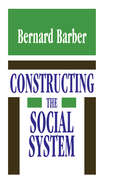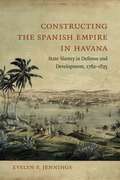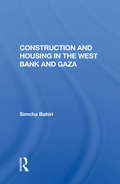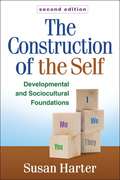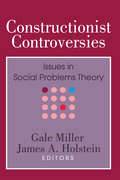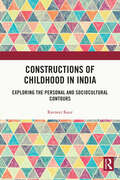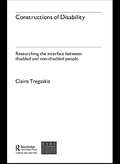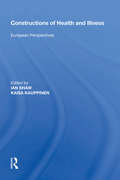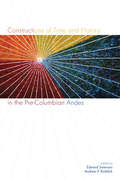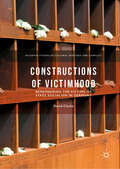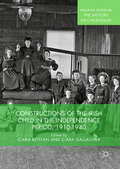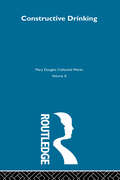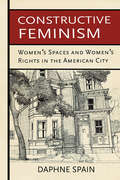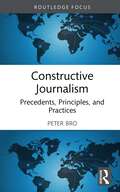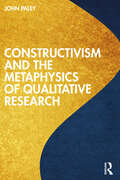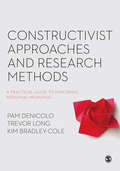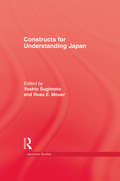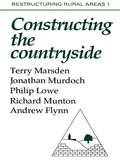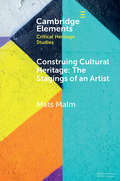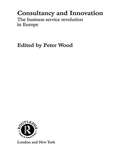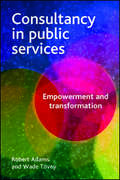- Table View
- List View
Constructing the Social System
by Bernard BarberBarber constructs a provisional, generalized, substantive theory of the social system, which he uses as the starting point and focus of his specialized researches. In this collection of his major writings in social system theory, Barber shows how he has used and developed such a framework over the last fifty years and demonstrates the application o
Constructing the Spanish Empire in Havana: State Slavery in Defense and Development, 1762-1835
by Evelyn JenningsConstructing the Spanish Empire in Havana examines the political economy surrounding the use of enslaved laborers in the capital of Spanish imperial Cuba from 1762 to 1835. In this first book-length exploration of state slavery on the island, Evelyn P. Jennings demonstrates that the Spanish state’s policies and practices in the ownership and employment of enslaved workers after 1762 served as a bridge from an economy based on imperial service to a rapidly expanding plantation economy in the nineteenth century. The Spanish state had owned and exploited enslaved workers in Cuba since the early 1500s. After the humiliating yearlong British occupation of Havana beginning in 1762, however, the Spanish Crown redoubled its efforts to purchase and maintain thousands of royal slaves to prepare Havana for what officials believed would be the imminent renewal of war with England. Jennings shows that the composition of workforces assigned to public projects depended on the availability of enslaved workers in various interconnected labor markets within Cuba, within the Spanish empire, and in the Atlantic world. Moreover, the site of enslavement, the work required, and the importance of that work according to imperial priorities influenced the treatment and relative autonomy of those laborers as well as the likelihood they would achieve freedom. As plantation production for export purposes emerged as the most dynamic sector of Cuba’s economy by 1810, the Atlantic networks used to obtain enslaved workers showed increasing strain. British abolitionism exerted additional pressure on the slave trade. To offset the loss of access to enslaved laborers, colonial officials expanded the state’s authority to sentence deserters, vagrants, and fugitives, both enslaved and free, to labor in public works such as civil construction, road building, and the creation of Havana’s defensive forts. State efforts in this area demonstrate the deep roots of state enslavement and forced labor in nineteenth-century Spanish colonialism and in capitalist development in the Atlantic world. Constructing the Spanish Empire in Havana places the processes of building and sustaining the Spanish empire in the imperial hub of Havana in a comparative perspective with other sites of empire building in the Atlantic world. Furthermore, it considers the human costs of reproducing the Spanish empire in a major Caribbean port, the state’s role in shaping the institution of slavery, and the experiences of enslaved and other coerced laborers both before and after the beginning of Cuba’s sugar boom in the early nineteenth century.
Construction And Housing In The West Bank And Gaza
by Simcha BahiriThe West Bank Data Base Project is an independent research group established in 1982 to study and analyze demographic, social spatial, legal, economic and political conditions in the West Bank and Gaza. The project, which is directed by Dr. Meron Benvenisti, is funded by the Rockefeller and Ford foundations and administered by The Brookings Institution, Washington, D.C. A continuously updated, computerized data base and its own research are the basis for the project's publications, including maps showing present and projected developments in the region.
Construction Workers Help (Our Community Helpers)
by Tami DeedrickConstruction workers build our homes, businesses, and stores. Learn about a construction worker's tools, workplace, and role in the community.
Construction of Evil in North East India
by C Joshua Thomas Prasenjit BiswasConstruction of Evil in North East India is an illuminating study on the concept of evil and its representations in literature, political theory and social and cultural movements. It encompasses a wide array of themes in the construction of 'evil' ranging from discourses about the belief in evil to the religious appropriation of 'evil' to its more contemporary politico-aesthetic construction. In order to explore the possible meanings of evil, it brings together essays contributed by scholars and practitioners from various human and social sciences such as philosophy, sociology and ethnography. Set in the tribal cultural mosaic of North East India, the book is an excellent exposition of the myths, narratives and discourses drawn from the tribal experiences of the region. It also examines the possibility of overcoming the forms of evil in correlation with both the 'local' and the 'global' situations of war, terror and redemption. The papers in this collection make a stimulating contribution to the debates centring the idea of evil and its application in public discourses.
Construction of the Self, Second Edition
by Susan Harter William M. BukowskiAn important work from a leading scholar, this book explores self-development from early childhood to adulthood. Susan Harter traces the normative stages that define the emergence of many self-processes, including self-esteem. She also addresses individual differences and societal influences on self-development. Presenting pioneering empirical research, Harter shows that increasingly mature features of the self have both benefits and liabilities for psychological adjustment. The book highlights the causes and consequences of different types of self-representations, including those that are unrealistically negative or positive. New to This Edition Reflects more than a decade of conceptual, empirical, and methodological advances. Provides a broader sociocultural framework for understanding self development. Chapters on emerging adulthood, self-esteem and physical appearance, self-processes in the classroom, motivation, cross-cultural issues, and the quest for authenticity. Expanded chapters on childhood, adolescence, and the self-conscious emotions, including humiliation. Increased attention to the liabilities of our contemporary preoccupation with the self.
Constructionist Controversies: Issues in Social Problems Theory
by James A. Holstein Gale Miller"Constructionist Controversies" reviews the substantial contributions to social problems theory that have been made by social constructionist theorists and examines debates about the future of this perspective. Intended for the student, the volume provides a succinct formulation of all the major issues of social constructionism by contributors who are well recognized within the field for the strength with which they articulate their own widely varied viewpoints.
Constructions of Childhood in India: Exploring the Personal and Sociocultural Contours
by Ravneet KaurThis book explores the dominant constructions of childhood as perceived by children and adults in contemporary Indian society. It unveils the everyday lived experiences of children within family life to explain the meaning of childhood and the position of children as social groups. Based on detailed qualitative study, this volume discusses the themes and issues that impact dominant constructions of childhood. It establishes childhood as a structurally constructed category and sheds light on how key social differences influence the diverse experiences of childhood. The book critically examines how children, as social actors, contribute to the structural space of childhood through the recognition of their own experiences, voices, and ways of interpretations. Further, it also compares and analyses childhoods of today with those of the past generations. Engagingly written and nuanced, the book will be of great interest to teachers and students of education, childhood studies, elementary education, sociology of education and social psychology. It will also be useful for teachers of teacher training institutions, policymakers, educationalists, education professionals, parents and researchers working with children and childhood studies.
Constructions of Disability: Researching Inclusion in Community Leisure
by Claire TregaskisThis innovative book discusses the meaning of 'inclusion' through the exploration of the interactions between disabled and non-disabled people at a community leisure centre. By exploring the nature of this interface, an understanding of how people create potential for both disability and inclusion is revealed. This book takes a very different approach to that of existing texts, which have tended to concentrate mainly on disabled people's exclusion. The advantage of this new approach is that it adds an extra dimension to our understanding of how discriminatory practice is variously perpetuated and challenged..Constructions of Disability is valuable reading for all people who are working towards increased social inclusion for disabled people, including theorists and students of disability studies and learning difficulty, leisure management and disability service providers, and their families. Using a practical case study approach, it explores the impact that social interaction between disabled and non-disabled people can have increasing or decreasing disabled people's opportunities for inclusion. Examples of both inclusive and discriminatory practice are described in detail, and the positive and negative effects of these actions on the participants are demonstrated and discussed. This insightful book offers a wide range of practical suggestions for the future development of more inclusive theory, policy and practice.
Constructions of Health and Illness: European Perspectives
by Kaisa KauppinenThis volume provides a comparative European overview focusing upon the main areas of social construction as it relates to health and illness. This includes an emphasis upon lay beliefs and the different way understandings of health can impact upon health behaviour. The contributors also examine health knowledge and the interaction and comparison between lay and professional knowledge systems. The book will be of particular interest to those studying, researching and working in the fields of health and the sociology of health and the body.
Constructions of Time and History in the Pre-Columbian Andes
by Edward Swenson and Andrew P. RoddickConstructions of Time and History in the Pre-Columbian Andes explores archaeological approaches to temporalities, social memory, and constructions of history in the pre-Columbian Andes. The authors examine a range of indigenous temporal experiences and ideologies, including astronomical, cyclical, generational, eschatological, and mythical time. This nuanced, interdisciplinary volume challenges outmoded anthropological theories while building on an emic perspective to gain greater understanding of pre-Columbian Andean cultures. Contributors to the volume rethink the dichotomy of past and present by understanding history as indigenous Andeans perceived it—recognizing the past as a palpable and living presence. We live in history, not apart from it. Within this framework time can be understood as a current rather than as distinct points, moments, periods, or horizons. The Andes offer a rich context by which to evaluate recent philosophical explorations of space and time. Using the varied materializations and ritual emplacements of time in a diverse sampling of landscapes, Constructions of Time and History in the Pre-Columbian Andes serves as a critique of archaeology’s continued and exclusive dependence on linear chronologies that obscure historically specific temporal practices and beliefs. Contributors: Tamara L. Bray, Zachary J. Chase, María José Culquichicón-Venegas, Terence D’Altroy, Giles Spence Morrow, Matthew Sayre, Francisco Seoane, Darryl Wilkinson
Constructions of Victimhood: Remembering the Victims of State Socialism in Germany (Palgrave Studies in Cultural Heritage and Conflict)
by David ClarkeThe post-war Federal Republic of Germany faced the task of addressing the plight of the victims of state socialism under the Soviet occupation of eastern Germany and in the German Democratic Republic, many of whom fled to the west. These victims were not passive objects of the West German state’s policy, but organized themselves into associations that fought for recognition of their contribution to the fight against communism. After German unification, the task of commemorating and compensating these victims continued under entirely new political circumstances, yet also in the context of global trends in memory politics and transitional justice that give priority to addressing the fate of victims of non-democratic regimes. Constructions of Victimhood: Remembering the Victims of State Socialism in Germany draws on the constructivist systems theory of Niklas Luhmann to analyze the role of victims organizations, the political system, and historians and heritage professionals in the struggle over the memory of suffering under state socialism, from the Cold War to the present day. The book argues that the identity and social role of victims has undergone a process of constant renegotiation in this period, offering an innovative theoretical framework for understanding how restorative measures are formulated to address the situation of victims. As such, it offers not only insights into a neglected aspect of post-war German history, but also contributes to the ongoing academic debate about the role of victims in process of transitional justice and the politics of memory.
Constructions of the Irish Child in the Independence Period, 1910-1940 (Palgrave Studies in the History of Childhood)
by Ciara Boylan Ciara GallagherThis volume explores how Irish children were ‘constructed’ by various actors including the state, youth organisations, authors and publishers in the period before and after Ireland gained independence in 1922. It examines the broad variety of ways in which the Irish child was constructed through social and cultural activities like education, sport, youth organizations, and cultural production such as literature, toys, and clothes, covering themes ranging from gender, religion and social class, to the broader politics of identity, citizenship, and nation-building. A variety of ideals and ideologies, some of them conflicting, competed to inform how children were constructed by the adults who looked on them as embodying the future of the nation. Contributors ask fundamental questions about how children were constructed as part of the idealisation of the state before its formation, and the consolidation of the state after its foundation.
Constructive Drinking
by Mary DouglasFirst published in 1987, Constructive Drinking is a series of original case studies organized into three sections based on three major functions of drinking. The three constructive functions are: that drinking has a real social role in everyday life; that drinking can be used to construct an ideal world; and that drinking is a significant economic activity. The case studies deal with a variety of exotic drinks
Constructive Feminism: Women's Spaces and Women's Rights in the American City
by Daphne SpainIn Constructive Feminism, Daphne Spain examines the deliberate and unintended spatial consequences of feminism's second wave, a social movement dedicated to reconfiguring power relations between women and men. Placing the women's movement of the 1970s in the context of other social movements that have changed the use of urban space, Spain argues that reform feminists used the legal system to end the mandatory segregation of women and men in public institutions, while radical activists created small-scale places that gave women the confidence to claim their rights to the public sphere. Women's centers, bookstores, health clinics, and domestic violence shelters established feminist places for women's liberation in Boston, Los Angeles, and many other cities. Unable to afford their own buildings, radicals adapted existing structures to serve as women's centers that fostered autonomy, health clinics that promoted reproductive rights, bookstores that connected women to feminist thought, and domestic violence shelters that protected their bodily integrity. Legal equal opportunity reforms and daily practices of liberation enhanced women's choices in education and occupations. Once the majority of wives and mothers had joined the labor force, by the mid-1980s, new buildings began to emerge that substituted for the unpaid domestic tasks once performed in the home. Fast food franchises, childcare facilities, adult day centers, and hospices were among the inadvertent spatial consequences of the second wave.
Constructive Journalism: Precedents, Principles, and Practices (Routledge Focus on Journalism Studies)
by Peter BroThis book offers a deep and comprehensive overview of constructive journalism, setting out the guiding principles and practices for a journalism that aims to do more than simply inform about problems. In this authoritative yet concise volume, Peter Bro asks what does constructive journalism mean, what are the underlying principles, how is it practiced, and in what ways does it differ from other types of journalism? Drawing on studies of the rapidly growing number of works by both journalism practitioners and researchers, the book reaches beyond these questions to show how the notion of being constructive has been a part of journalism from the very beginning of the profession. This introduction to what constructive journalism is and was and what it can accomplish will guide new journalists; journalism, media, and mass communication students; and scholars working on journalistic theory and practice.
Constructivism and the Metaphysics of Qualitative Research
by John PaleyThis book challenges the widespread assumption that a necessary preliminary to qualitative research is the formulation of ontological and epistemological beliefs. It argues that the metaphysical claims which supposedly underpin different approaches to social research do not make sense. Literally. Sentences such as ‘There is a single objective reality’ and ‘There are multiple constructed realities’ fail to make information-providing statements. They do not refer or describe. Despite appearances, they say nothing about reality (or realities) at a fundamental level, so they cannot be used to justify, ground, or align with, methodological decisions. The ‘necessary preliminary’ turns out not to be necessary at all; and we can dispense with, not just ‘paradigms’, but metaphysical underpinnings in general, whether structured as paradigms or not.Drawing on Wittgenstein’s later philosophy, Carnap’s metametaphysics, and contemporary linguistics, the book suggests that the metaphysical claims of qualitative texts can be reinterpreted as performative. Ontological and epistemological beliefs are resolutions and proposals, recommendations for the use of language. They form part of a creed by means of which researchers enact the joining of an academic community. Written in Paley’s trademark clear, accessible and conversational style, the book points to a revolution in our understanding of the relation between metaphysics and social research. It will be essential reading for anyone interested in qualitative research and its philosophical foundations.
Constructivist Approaches and Research Methods: A Practical Guide to Exploring Personal Meanings
by Pam Denicolo Trevor Long Kim Bradley-ColeThis book provides a comprehensive overview of personal construct psychology (PCP) that will help researchers understand the why′s, what′s and how′s of conducting a rigorous constructivist research project. From the theoretical underpinnings of constructivist approaches to the practical values of these techniques, these three expert authors explain how to conduct interpretative, constructivist research from inception to completion. Key topics include: Understanding research philosophies and paradigms Constructing and exploring personal realities Establishing effective research procedures Evaluating grids, mapping, narrative and other research methods Managing the practicalities of fieldwork Analysing and presenting data With activities and procedural examples from a wide range of disciplines woven throughout the text and two special chapters featuring in-depth case studies from a variety of constructivist researchers, this book helps readers grasp the tools, designs, and opportunities of interpretative research. An essential companion for both researchers and practitioners looking to understand people’s values, attitudes, beliefs, perceptions, or motivations!
Constructivist Approaches and Research Methods: A Practical Guide to Exploring Personal Meanings
by Professor Pam Denicolo Mrs Kim Bradley-Cole Trevor LongThis book provides a comprehensive overview of personal construct psychology (PCP) that will help researchers understand the why's, what's and how's of conducting a rigorous constructivist research project. From the theoretical underpinnings of constructivist approaches to the practical values of these techniques, these three expert authors explain how to conduct interpretative, constructivist research from inception to completion. Key topics include: Understanding research philosophies and paradigms Constructing and exploring personal realities Establishing effective research procedures Evaluating grids, mapping, narrative and other research methods Managing the practicalities of fieldwork Analysing and presenting data With activities and procedural examples from a wide range of disciplines woven throughout the text and two special chapters featuring in-depth case studies from a variety of constructivist researchers, this book helps readers grasp the tools, designs, and opportunities of interpretative research. An essential companion for both researchers and practitioners looking to understand people’s values, attitudes, beliefs, perceptions, or motivations!
Constructs For Understanding Japan
by SugimotoFirst published in 1989. Routledge is an imprint of Taylor & Francis, an informa company.
Constructuring The Countryside: An Approach To Rural Development
by Philip Lowe Terry Marsden Andrew Flynn Jonathon Murdoch Richard C MuntonAs the first book in the Restructuring Rural Areas series, "Constructing the countryside" presents a new methodological approach to the analysis of rural change. The authors seek to link wider developments in the global political economy to the behaviour of local actors and, in so doing, they place research into rural studies much more firmly than hitherto in the mainstream of social science enquiry. The outcome is a book that promotes a truly interdisciplinary approach through which the constant "reconstruction" of the countryside can be properly understood. This holistic perspective, sustained by an historical analysis of rural change, has been made possible by the extensive research experience of the authors.; The book is a product of the work done at the London Countryside Research Centre, which was set up in 1989 by the Economic and Social Research Council. The Centre's research has focused upon the social and political forces for change in rural areas and how these relate to rapid alterations in national economic circumstances and to public policies affecting the countryside for example, the Common Agricultural Policy of the EC .; On the one hand, the book provides a set of insights into the trends that will guide rural change in advanced economies into the next century; on the other, it offers a challenging account of how they can be investigated.; "Constructing the countryside" will appeal to both students and staff in a wide range of social science disciplines, including agricultural economics, environmental management, planning, land economy, geography and rural sociology, and to all those concerned with the future development of rural areas.; This book is intended for students and researchers in rural planning and environmental/geographical studies, whether within a geographical or a sociological milieu.
Construing Cultural Heritage: The Case of Ivar Arosenius (Elements in Critical Heritage Studies)
by Mats MalmThis study examines how an artist construed himself as cultural heritage by the turn of the 19th century, how this heritage was further construed after his death, and how the artworks can be made to further new approaches and insights through a digital archive (aroseniusarchive.se). The study employs the concept of 'staging' to capture the means used by the artist, as well as by reception, in this construal. The question of 'staging' involves not only how the artist has been called forth from the archives, but also how the artist can be called forth in new ways today through digitization. The study first elaborates on the theoretical framework through the aspects of mediation and agency, then explores how the artist was staged after his death. Finally, the artist's own means of staging himself are explored. Swedish painter Ivar Arosenius (1878–1909) is the case studied.
Consuls and Res Publica
by Hans Beck Martin Jehne Francisco Pina Polo Antonio DupláThe consulate was the focal point of Roman politics. Both the ruling class and the ordinary citizens fixed their gaze on the republic's highest office - to be sure, from different perspectives and with differing expectations. While the former aspired to the consulate as the defining magistracy of their social status, the latter perceived it as the embodiment of the Roman state. Holding high office was thus not merely a political exercise. The consulate prefigured all aspects of public life, with consuls taking care of almost every aspect of the administration of the Roman state. This multifaceted character of the consulate invites a holistic investigation. The scope of this book is therefore not limited to political or constitutional questions. Instead, it investigates the predominant role of the consulate in and its impact on, the political culture of the Roman republic.
Consultancy and Innovation: The Business Service Revolution in Europe (Routledge Studies in International Business and the World Economy #Vol. 25)
by Peter WoodConsultancy and Innovation links two important aspects of European economic development in the past thirty years: the pace of technical and management innovation, and the growing significance of technical and business consultancy. This book includes detailed studies of consultancy activities or 'knowledge intensive services' (KIS) in eight EU countries, written by national experts in the field.
Consultancy in Public Services: Empowerment and Transformation
by Robert Adams Wade ToveyBased on the authors' twenty-five year experience of consultancy in the public services, this book develops an empowering approach to thinking about and doing consultancy with public services. It challenges the traditional view that the consultants are brought in as experts and instead examines ways of using consultancy to empower staff, patients, service users and members of the public, so that they can take part in developing, changing, innovating and ultimately transforming these services. The book includes chapters explaining consultancy, on preparing bids, on negotiations and on the importance of assessment and review which are geared towards the needs of those working in public and third sectors, either as or with consultants. It includes a glossary, abbreviations, helpful contacts and websites which are valuable for quick reference and to aid further understanding.
